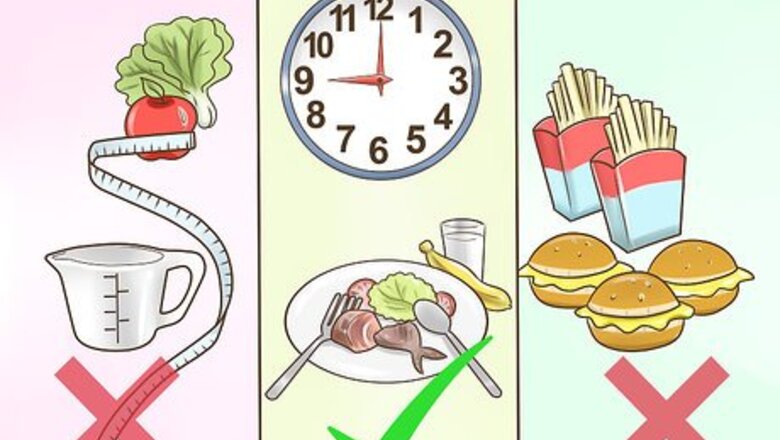
views
X
Trustworthy Source
Centers for Disease Control and Prevention
Main public health institute for the US, run by the Dept. of Health and Human Services
Go to source
Focusing on Health
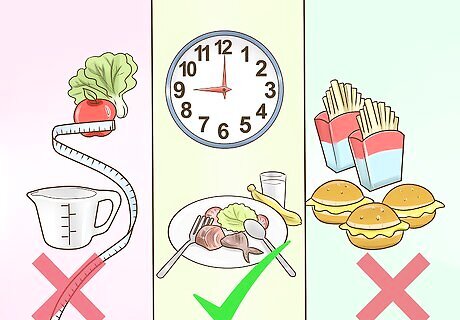
Aim for moderation rather than perfection. Being a perfectionist in your health goals may end up impeding your progress. If you try to be perfect in your new diet and eating habits, you may end up being so hard on yourself that you give up on the diet entirely. Instead, aim for moderate or small improvements in your diet and try to stick to them.

Consider whether your diet is negatively impacting your social life. You may want to re-evaluate your new diet if it is stopping you from living the kind of life you want to lead. If your new diet is stopping you from attending social events with friends and family, perhaps you should modify your dietary goals so that you can still have a social life. There's nothing wrong with going out for ice cream or fast food from time to time. As long as you have healthy habits overall, you're fine.
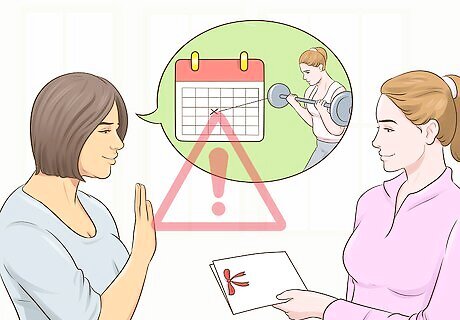
Check whether you are routinely cancelling social events to exercise. Cancelling a lot of social events with friends and family to get to the gym may be a sign of unhealthy exercise goals. The strength of social connections with friends and family is an important factor in your health. Make sure you aren’t sacrificing a healthy social life to get to the gym, since you need both social ties and an active lifestyle to be healthy.
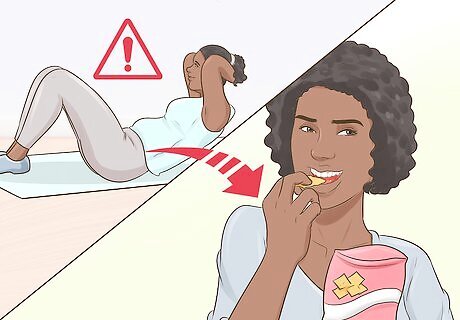
Reflect on whether you view exercise as a form of compensation for poor eating. You should not aim to exercise so you can eat more brownies, chips or other junk food. An exercise plan built around compensating for poor eating habits will not make you healthier. Instead, you should focus on a well-rounded, healthy diet and a regular exercise routine. Exercise should not be "punishment" for eating something. It should be something you enjoy (or at least tolerate), and that you can feel proud of accomplishing.

Get medical help if you are unsure about your health goals. Ask your family doctor for advice on specific health goals that would be healthy for you. In conversation with your doctor, set specific and measurable health goals that are meaningful to you. Ask your doctor: “I see a lot of people doing the vegetarian diet. Do you think this would work for me?” Inquire: “How much should I exercise each week if I want to lose weight by the summer?” For instance, if you want to be able to swim a certain distance by the summer, use this as a starting point for setting your goals. The goals you set should be specific and you should be able to measure your progress over time.
Avoiding Unhealthy Diet Goals
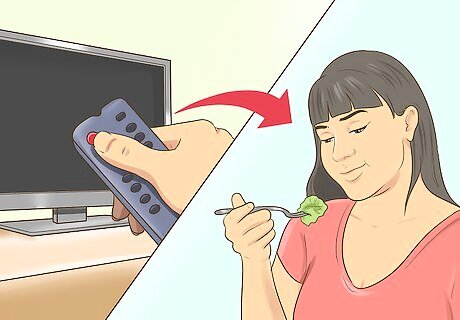
Focus more on healthy eating habits and less on a strict diet. If you want to lose weight, you may be tempted to start a completely new diet from scratch. However, abruptly starting a new diet often results in failure, and yo-yo dieting can harm your metabolism. Start small. Instead, focus on adjusting your habits in little ways: Buy healthy foods that you enjoy eating. Look for fruits, vegetables, and whole grains. The next time you feel hungry, reach for those. Don't feel like you have to cut out an entire food group! You need carbs, protein, and fats to function—it's all about getting the right ones in the right amounts. Instead of eating in front of the television, try mindful eating. You may be consuming too much food because you are eating while “spaced out” instead of focusing on your food. Try to just eat and pay attention to the food, which may help you to eat less. Stop eating late at night. Eating a lot right before bed tends to lead to weight gain. Avoid skipping breakfast. If you skip breakfast, you may end up overeating at lunch. More importantly, you need to eat breakfast because your blood sugar levels are low in the morning, and blood sugar is necessary for your brain and muscles to function properly. Give yourself time to enjoy a relaxed and fulfilling breakfast. Cut back on sugar as best as you can.
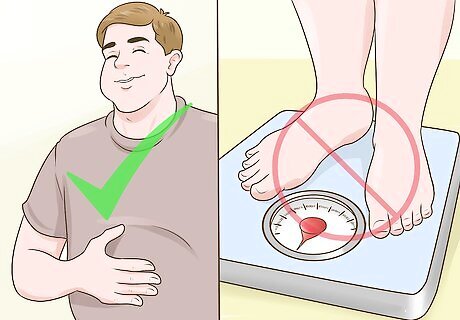
Aim to eat until your feel full instead of losing a certain amount of weight. Try to train your body to recognize when it is full. This is better than than trying to lose a certain number of pounds, which can often be a poor diet goal because it focuses too much on the outcome and not enough on the necessary behavior changes. You can train yourself to notice when you are full by serving smaller portions and integrating a “check in” moment at each meal. Serve yourself a small portion. After eating your small portion, check in with your tummy and ask yourself whether you feel full. Give yourself five minutes for the check in before deciding whether or not to eat more food. If you feel full after the five minute wait, you don’t need to eat more.
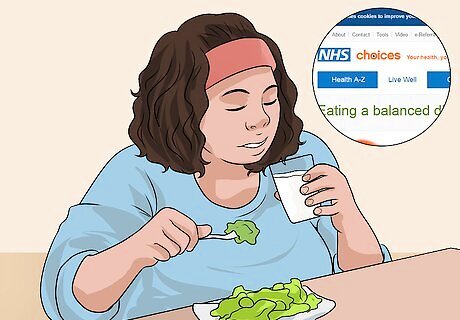
Listen to your body. When you feel hungry, your body is trying to tell you something important. Eat what you need to eat. Pay attention to cravings. What type of food are you craving? Salt? Fats? Greens? Identify the type of food that your body needs, and look for a reasonably healthy food that fits. Eat when you're hungry. If it's in between meals, try a healthy snack. Don't eat food that you hate. Instead, go for a healthy food that you can enjoy. You absorb nutrients better when you like what you're eating. For example, if you like spinach but hate kale, then skip the kale and enjoy a spinach salad.
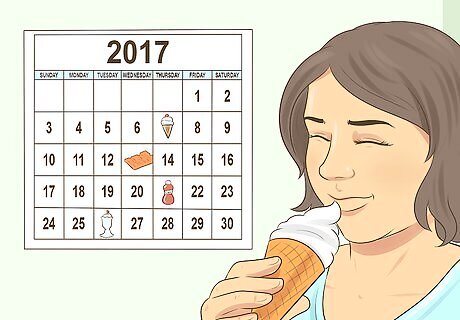
Give yourself one cheat meal a week if you are on a new diet. Instead of eating every meal according to your new diet plan, give yourself a break. By allowing yourself at least one meal where you can eat anything you desire, you will eliminate the feeling that there is no way out. It is better to aim for improvement, as opposed to perfection, so just try to stick to your diet generally and give yourself a break once a week.
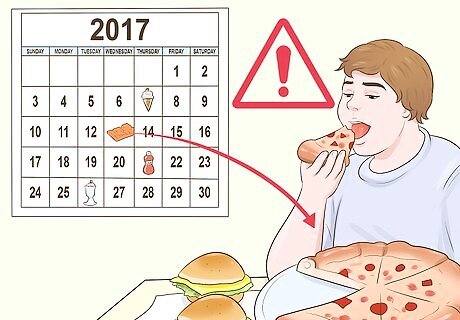
Notice if you feel a strong urge to binge on your “cheat day.” If you are following a strict diet with one day of the week where you allow yourself to eat anything, it is not an excuse to binge on unhealthy food choices. If you feel a strong urge to binge, it may be that your diet is too restrictive. Work on striking a better balance.
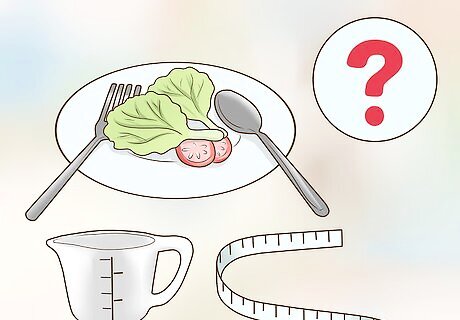
Reflect on whether you are just following a fad diet. Your new diet may be unhealthy if you are simply following a new fad diet such as, but not limited to, the Paleo diet or Atkins diet. Although all of these diets can work great for many people and for a variety of reasons, you should not follow a diet simply because it is new and exciting. You should find a diet that works for you and adapt it to your body type, health and fitness goals. Be cautious about diets that cut out major food groups. These usually aren't sustainable. If you do make the change, consult a doctor first, and try to do it gradually.
Avoiding Unhealthy Fitness Goals
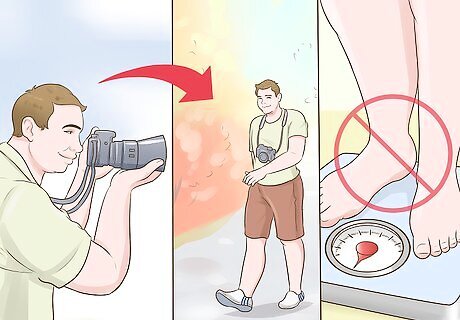
Avoid setting goals based on external sources of information. Instead of focusing on goals like losing weight or looking trim, find an activity that you truly enjoy. Build your fitness goals around an activity that you really like, as opposed to focusing on abstract goals that you don’t feel connected to. Instead of focusing on getting ripped abdominal muscles, find a sport you like and join the local recreation league. Connect fitness to a hobby you enjoy. If you are a photographer, go for a walk with your camera and take pictures along the way. Instead of focusing on losing a certain amount of weight, find an activity you enjoy that involves exercise and devote time to this activity. If you enjoy walking in the park, spend more time walking in the park and worry less about the amount of weight you need to lose.
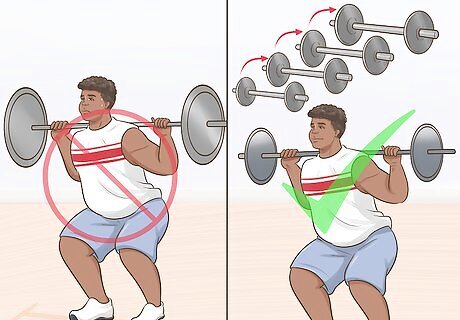
Break down your big goal into smaller goals. Instead of focusing on one huge goal such as lifting 300 pounds, focus on small and measurable goals. Your goals should be measurable on a weekly basis. If your big goal is to be able to do 10 push-ups, start with just 1, then 2, then 5, and so on. If your big goal is to be able to bike for 2 hours straight, first work on biking for 30 minutes, then 45 minutes, et cetera. If your big goal is to squat 300 pounds, focus on the small goal of increasing your squat lift by five pounds every couple weeks. If your big goal is to lose fifty pounds, focus on the small goal of going for a run every other day and avoid checking your weight more frequently than once a month. Take time to reward yourself with a non-food-related prize once you reach your goal! For instance, you might buy yourself a sports bra after exercising consistently for 1 week.
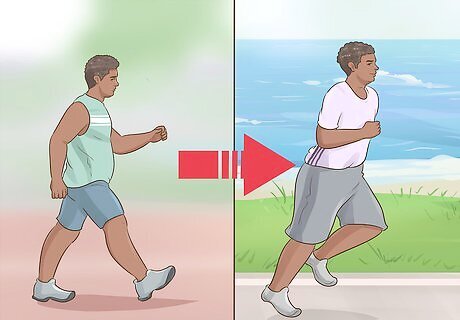
Change your exercise routine and pay less attention to outcomes. Instead of focusing on how much you want to squat at the gym or the distance you want to run, focus on your training process. If you make time to practice squatting a few times a week, you should be able to gradually achieve your desired outcome. Pay more attention to your fitness process.
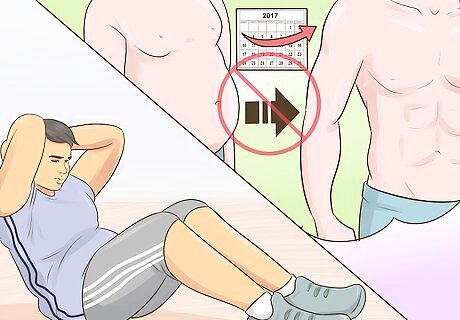
Avoid expecting instant payback. You should avoid the expectation to see instant results from your new fitness routine. Going to the gym three or four times a week should improve your overall condition, if that is your goal, but you are unlikely to notice immediate results such as a six pack or vast amounts of weight loss.
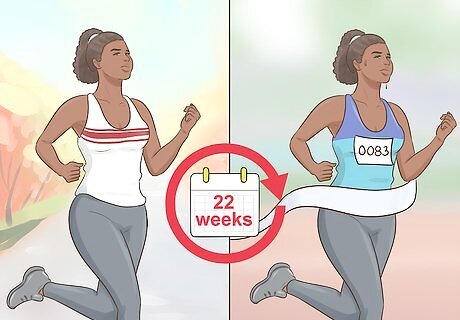
Give yourself enough time to train. You should allocate a proper amount of time for achieving your fitness goals. If you skimp on time, you may get hurt in the training process. Avoid injuries by giving yourself the proper time to train. If you want to run a marathon and you are a beginner level runner, you will need around 22 weeks (almost half a year). If you don’t give yourself the proper training time, you may hurt yourself.




















Comments
0 comment